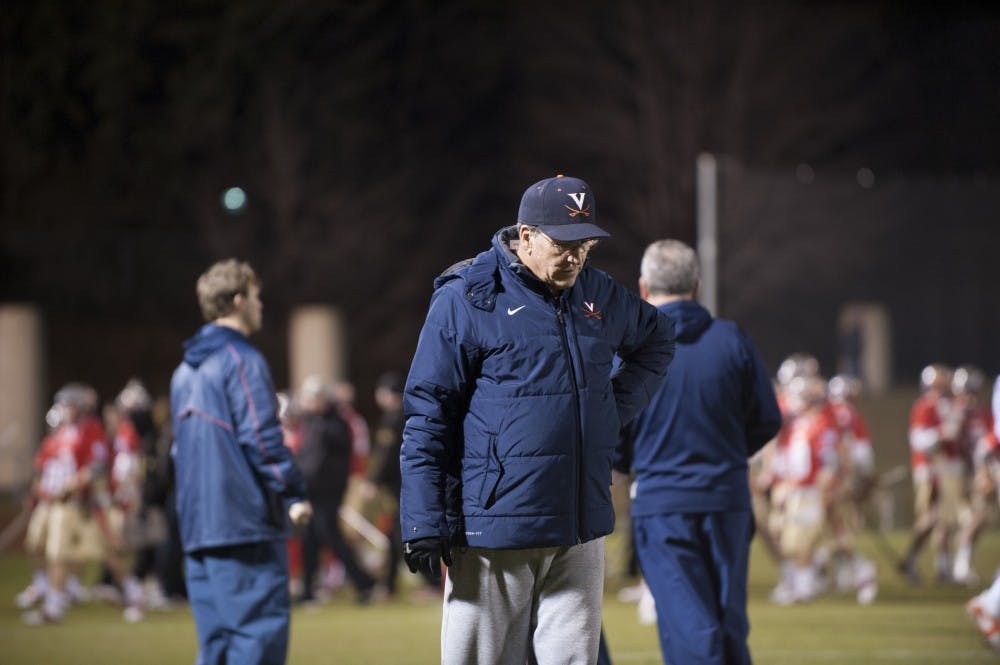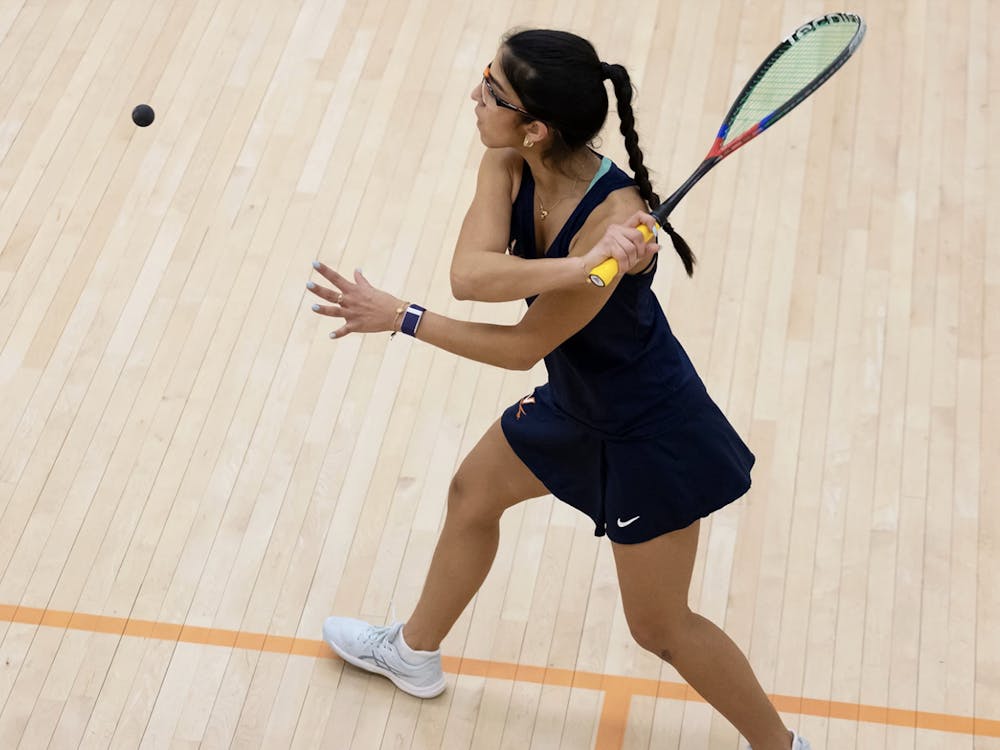For only the second time in his 21-year career at Virginia and for the first season since 2004, coach Dom Starsia leads his squad to the ACC Tournament needing to win out in order to qualify for the NCAA Tournament. But where Starsia’s 2004 squad couldn’t cut it — losing in the finals to Maryland, 12-11 — his 2013 team believes it can make a run.
The Cavaliers’ (6-7, 0-3 ACC) path will not be easy, as they will open tournament play against top-seeded No. 3 Maryland. If they manage to enact revenge against the Terrapins, who took a 9-7 victory at Klöckner Stadium earlier this season, they will face either No. 1 North Carolina or No. 5 Duke — both of which defeated Virginia by three goals in the regular season — with NCAA Tournament eligibility on the line.
“I think all the games have been relatively close in the conference,” Starsia said. “We’re the lower-seeded team, but I don’t feel like that’s an issue for us. We’re going into this game with every intent of winning and I think that’s a realistic expectation for us. These four teams are always ranked among the best in the country and I think all the games promise to be close and hard-fought.”
Despite enduring a miserable six-game losing streak, the longest of any Starsia-coached Virginia team, the Cavalier players believe winning the ACC Tournament should garner the team strong consideration for NCAA Tournament selection.
“No. 1 strength of schedule in the country and you come away with two top-10 wins over Maryland and then either UNC or Duke — I think that’s a pretty good case for us to get into the Tournament,” sophomore defenseman Greg Danseglio said. “Definitely not a No. 1 seed, but I think we’ll be in the talk about it and I think we should get in.”
Even if Virginia wins the ACC Tournament, to finish at 8-7 and above the .500 win percentage threshold required for postseason eligibility, there is still the possibility that the team will be passed over for selection. Unlike the eight other Division I conferences, the ACC does not have an automatic qualifying bid to the NCAA Tournament for its conference tournament champion because the league falls short of the six-team minimum.
“It’s just it’s never been that big of a deal, in the sense that if you win the ACC Tournament [then] you’re going to the NCAA Tournament,” Starsia said. “At the same time I would tell you with the way things are changing now, it’s a little hard to anticipate what the future might hold. So with six of us in the conference next year … I think it’s nice to have that [Automatic Qualifying] in the bank as another way to have access to the Tournament.”
With lacrosse powerhouses Syracuse and Notre Dame joining the ACC in 2014, conference play will only become more rigorous. And though next season will be Maryland’s last in the ACC, dropping the conference to five lacrosse-playing schools, the ACC will retain the automatic qualifying bid for an additional two years — though Starsia is advocating for a permanent fix.
“What we need to do after Maryland leaves is to find a sixth school so that we can keep it in forever,” Starsia said. “And so we had talked about the ACC Tournament in the future as maybe only the top four seeds playing, but now with an [automatic qualification] at stake, maybe all six should be playing. We’re debating all those issues in the background right now.”
Starsia suggested Virginia Tech or Wake Forest would make sense as possible additions to the conference, while also speculating about Louisville when it joins the ACC in 2014. He said an expanded ACC lacrosse field would draw national media attention and cement a spring sports presence in the Northeast for potential incoming teams, but he also acknowledged the limitations imposed by Title IX and athletic budgets that could hinder such an expansion.
Until next year, the ACC does not have an automatic qualifying bid and thus the Cavaliers must win or spend May watching the Tournament from home. But with the toughest schedule in the nation and six losses to top-15 teams by three goals or less, it raises the issue of whether or not the .500 criteria is fair when applied to this year’s Virginia team.
“The rule is what it is, we’re well aware of it,” Starsia said. “I thought even back in 2004 when we didn’t have a winning record, we had more wins over playoff teams than most anybody else in the field, we just didn’t have a winning record. But we accepted the consequences of how that played out, so it’s not something I spend a lot of time with.”
The current four-team ACC Tournament has been criticized as redundant, providing an additional rematch or two from the regular season while lacking an NCAA Tournament bid. Starsia suggested that he and his ACC counterparts might prefer to schedule more interesting non-conference opponents, but can’t because of the conference tournament.
“We oftentimes sit at the ACC meetings amongst the coaches and try to imagine, ‘Why are we doing this exactly — why are we beating our heads against the wall with each other?’” Starsia said. “In years when we’ve just gotten through our Maryland-Carolina-Duke stretch, to think we’re going back to the ACC Tournament for two more was a lot to ask.”
Although the ACC Tournament can prove to be a brutal weekend with emotional, high-intensity games packed into a short window, it offers certain benefits as well.
“If the kids had to vote, they would vote to keep it — they really like it,” Starsia said. “The games are televised. … We’re one of the sports in our conference that competes for national championships consistently and [Virginia’s] one of the best draws in the conference tournament also. So the conference likes us, and that’s not a bad thing either, having the conference be concerned about men’s lacrosse.”
This weekend in Chapel Hill, the Cavalier players and coaches will attempt to set aside the distractions of their recent losing streak and the possibility of not making the Tournament, instead focusing solely on leaving Kenan Stadium with a pair of tournament-quality wins and the team’s first ACC Championship since 2010. After that, it’s beyond the team’s control.
“Ultimately the biggest thing is being able to make a run in the [NCAA] Tournament,” junior midfielder Rob Emery said. “If you’re able to do that, what you did for the first part of the season really doesn’t mean anything. But in order to do that, you have to be in the Tournament and that’s our goal this weekend — to try to make a case for ourselves in that discussion.”







